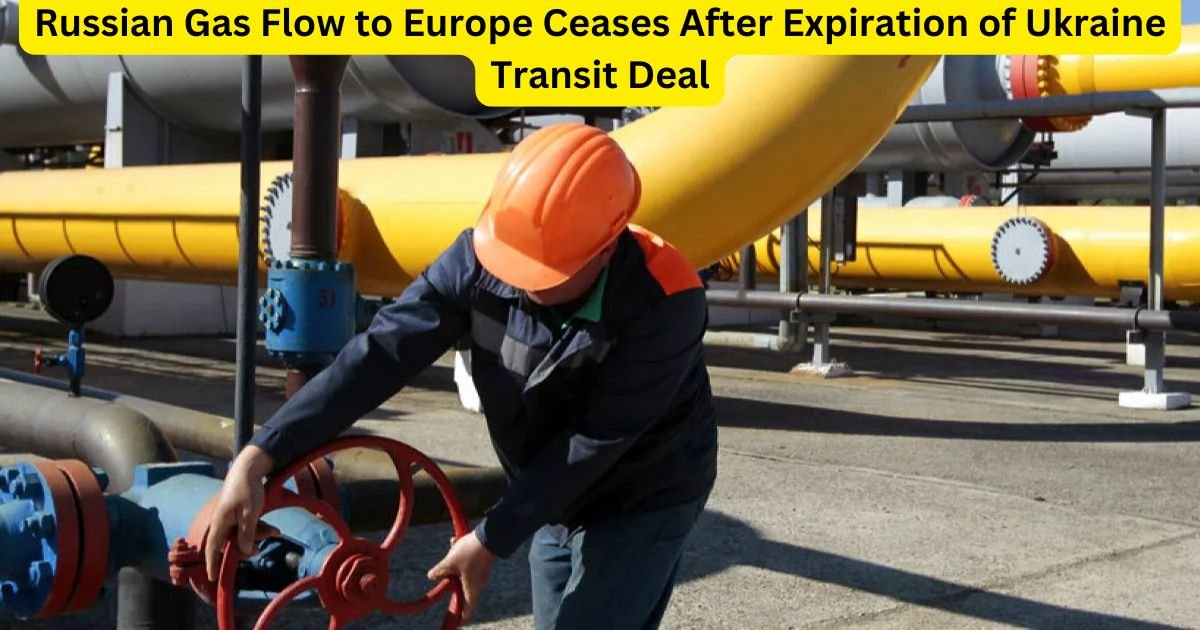Russia’s natural gas exports to Europe via Ukraine came to a halt on Wednesday, following the expiration of a five-year transit agreement between the two countries. The deal, which had been in place since 2020, was not renewed after Kyiv signaled it would not extend the agreement amid the ongoing conflict with Russia.
Ukraine’s Energy Minister, German Galushchenko, confirmed the cessation of gas transit, calling it a “historic event” that would have significant financial consequences for Russia. “Russia is losing its markets, and Europe has already decided to move away from Russian gas,” Galushchenko stated.
Russia’s state-owned energy giant Gazprom confirmed the halt in gas deliveries, stating that, due to Ukraine’s refusal to renew the agreement, it no longer had the legal or technical capacity to transport gas through Ukrainian territory. The disruption began at 8 a.m. Moscow time (05:00 GMT) on January 1, 2025.
Ukraine has been a critical transit route for Russian gas supplies to several European countries, including Slovakia, Hungary, and Moldova. The decision to stop gas shipments comes as part of Kyiv’s broader strategy to distance itself from Russian energy supplies amid the ongoing war.
European Union officials have downplayed the immediate impact, emphasizing that the bloc has been preparing for a scenario without Russian gas transiting through Ukraine for over a year. “We have been working on alternative strategies to secure energy supplies, and we are confident that these measures will mitigate any disruptions,” the EU Commission said in a statement to AFP.
However, not all EU leaders are as optimistic. Slovakian Prime Minister Robert Fico strongly criticized the move, warning that it would have serious repercussions for Europe. “This will have a drastic impact on all of us in the EU, but it will not affect Russia in the same way,” Fico said in a video posted on social media. Fico, who has been a vocal critic of the EU’s stance on Ukraine, recently visited Moscow to meet with President Putin and expressed concerns about the potential cessation of gas flows.
The situation is particularly dire for Moldova, a small nation that shares a border with Ukraine and is already dealing with the threat of Russian-backed separatism. Moldova’s President Maia Sandu condemned the move, accusing the Kremlin of using energy as a political weapon. “The Kremlin is trying to destabilize us ahead of the 2025 parliamentary elections and undermine our European aspirations,” Sandu said.
The end of this transit agreement marks the culmination of a long-running energy dispute between Russia and Ukraine, which dates back to Russia’s annexation of Crimea in 2014. For years, Russia used its energy exports as leverage over European nations, frequently raising prices or threatening to cut off supplies during the winter months.
According to Al Jazeera’s Jonah Hull, this marks the definitive end of Russia’s former dominance over Europe’s energy market. “The EU had been vulnerable to Russian pressure in the past, but this situation will accelerate Europe’s transition to alternative energy sources, even if at the cost of higher prices and economic strain,” Hull noted from Kyiv.
While Russia’s natural gas exports to Europe have dwindled dramatically since the beginning of the war in 2022, Moscow still sends gas to some parts of Europe through its TurkStream pipeline beneath the Black Sea. Hungary, a country with close ties to Russia, continues to receive the majority of its Russian gas via this route, and is less likely to be affected by the cessation of transit through Ukraine.
The European Union, which reduced its dependence on Russian gas after the war began, has found alternative sources such as liquefied natural gas (LNG) imports and pipeline supplies from other countries. As of December 2024, the EU was receiving less than 14 billion cubic meters of gas annually from Russia, a sharp decline from 65 billion cubic meters per year under the last transit deal. The European Commission has stated that the shortfall can be fully compensated by non-Russian supplies.
As Europe adjusts to this new reality, the end of Russian gas transit via Ukraine is expected to further accelerate the region’s energy diversification efforts, despite the economic challenges that come with it.
Read More News:
U.S. Treasury Hacked in Cyberattack; China Allegedly Involved, FBI Investigation Ongoing
Fire Destroys Quebec Heritage Site, Former Home of Celebrated Artist Charles Daudelin
